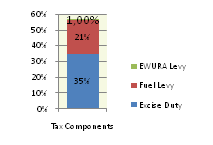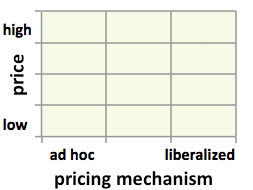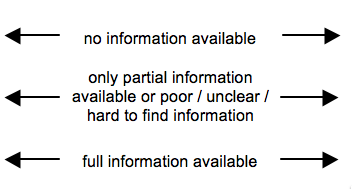Difference between revisions of "Fuel Prices Tanzania"
***** (***** | *****) |
***** (***** | *****) m |
||
| (One intermediate revision by one other user not shown) | |||
| Line 1: | Line 1: | ||
{{Fuel Price Factsheet | {{Fuel Price Factsheet | ||
|Fuel Price Country=Tanzania | |Fuel Price Country=Tanzania | ||
| − | |Fuel Pricing Policies=The | + | |Fuel Pricing Policies="Pricing policy: The downstream petroleum sector was deregulated in 2000. In July 2007, Petroleum (Conservation) Act was amended to make Energy and Water Utilities Regulatory Authority (EWURA) the economic regulator of the sector. There is a regulatory levy on petroleum products to finance EWURA. Energy and Water Regulatory Authority (Petroleum Products Price Setting) Rules, published in Jan 2009, requires indicative and maximum prices to be issued; rules and pricing formulae were amended in Jul 2011. Prices were issued twice a month but switched to once a month in 2012. Currently price ceilings on gasoline, diesel, and kerosene are set for wholesale (one uniform price for each fuel) and retail (differing by region). Government removed VAT on petroleum products in the 2006/07 budget. Excise duties for diesel and kerosene were adjusted in Jul 2011 to narrow and even eliminate the price difference between the two fuels, which previously favored kerosene by a wide margin and led to large-scale adulteration of diesel with kerosene. In mid-Oct 2011, government reported that kerosene imports had fallen by two thirds and diesel imports rose by 50% as a result. Oil marketing companies complained in Aug 2011 that the new ceilings on Aug 3 forced them to operate at a loss, said they would operate at a loss for only 24 hours, and stopped selling for a week. After threatening to revoke licenses, government raised prices 12 days later, but not before suspending BP Tanzania’s wholesale license for three months. In Feb 2012, Director of the Environment Division in the Prime Minister’s Office said government was considering subsidizing LPG to stem deforestation. |
| − | + | Information: EWURA posts price ceilings by fuel type and location on its Web site in English and Kiswahili. All filling stations are required to post petroleum product prices on boards that are clearly visible and show prices charged, discounts offered, and any trade incentives or promotions on offer." | |
| + | |||
| + | (Source: Kojima, Masami. (2013, forthcoming). “Petroleum product pricing and complementary policies:Experience of 65 developing countries since 2009.” Washington DC: World Bank.) | ||
|Fuel Currency=TZS | |Fuel Currency=TZS | ||
|Fuel Price Exchange Rate=1475.90 | |Fuel Price Exchange Rate=1475.90 | ||
| Line 42: | Line 44: | ||
|Fuel Price Factsheet Source Annotation=Cap prices February 2013 | |Fuel Price Factsheet Source Annotation=Cap prices February 2013 | ||
}} | }} | ||
| + | |||
| + | [[Category:Tanzania]] | ||
Latest revision as of 12:58, 23 September 2014
Part of: GIZ International Fuel Price database
Also see: Tanzania Energy Situation
Fuel Pricing Policies
| Local Currency: | TZS |
| Exchange Rate: | 1475.90
|
| Last Update: |
"Pricing policy: The downstream petroleum sector was deregulated in 2000. In July 2007, Petroleum (Conservation) Act was amended to make Energy and Water Utilities Regulatory Authority (EWURA) the economic regulator of the sector. There is a regulatory levy on petroleum products to finance EWURA. Energy and Water Regulatory Authority (Petroleum Products Price Setting) Rules, published in Jan 2009, requires indicative and maximum prices to be issued; rules and pricing formulae were amended in Jul 2011. Prices were issued twice a month but switched to once a month in 2012. Currently price ceilings on gasoline, diesel, and kerosene are set for wholesale (one uniform price for each fuel) and retail (differing by region). Government removed VAT on petroleum products in the 2006/07 budget. Excise duties for diesel and kerosene were adjusted in Jul 2011 to narrow and even eliminate the price difference between the two fuels, which previously favored kerosene by a wide margin and led to large-scale adulteration of diesel with kerosene. In mid-Oct 2011, government reported that kerosene imports had fallen by two thirds and diesel imports rose by 50% as a result. Oil marketing companies complained in Aug 2011 that the new ceilings on Aug 3 forced them to operate at a loss, said they would operate at a loss for only 24 hours, and stopped selling for a week. After threatening to revoke licenses, government raised prices 12 days later, but not before suspending BP Tanzania’s wholesale license for three months. In Feb 2012, Director of the Environment Division in the Prime Minister’s Office said government was considering subsidizing LPG to stem deforestation.
Information: EWURA posts price ceilings by fuel type and location on its Web site in English and Kiswahili. All filling stations are required to post petroleum product prices on boards that are clearly visible and show prices charged, discounts offered, and any trade incentives or promotions on offer."
(Source: Kojima, Masami. (2013, forthcoming). “Petroleum product pricing and complementary policies:Experience of 65 developing countries since 2009.” Washington DC: World Bank.)
Fuel Prices and Trends
| Gasoline 95 Octane | Diesel | |
|---|---|---|
| in USD* |
|
|
| in Local Currency |
|
|
* benchmark lines: green=US price; grey=price in Spain; red=price of Crude Oil
Fuel Price Composition
Price composition for one litre of Gasoline 95 Octane as of 2008/09/01.


(* including distribution and transport margins)
- All values shown base on the source given below, basing on the pump price for the city of Arusha.
- Source: http://www.ewura.go.tz/pdf/Microsoft%20Word%20-%20PRESS%20FUEL%20PRICE%20-%20Week%201%20September%202008%20-Edited%208th%20Sep%202008.pdf
At a Glance
| Regulation-Price-Matrix |
| ||||
 |

|

|

| ||
Some information is difficult to find; the arrangement of information on EWURAs web page might be improved.
Sources to the Public
| Type of Information | Web-Link / Source |
|---|---|
| Other Information | http://www.ewura.go.tz/pdf/ |
| Price Composition | http://www.ewura.go.tz/pdf/Notices/Detailed_Analysis.pdf |
| Pump prices and margins | http://www.ewura.go.tz/newsite/attachments/article/80/Cap_Prices_WEF_6_February_2013_-_English.pdf (Cap prices February 2013) |
| Pump prices and margins | http://www.ewura.go.tz/fuelprices.html |
| Wholesale Prices | http://www.ewura.go.tz/fuelprices.html |
Contact
Please find more information on GIZ International Fuel Price Database and http://www.giz.de/fuelprices
The following coordinate was not recognized: {{#geocode: Tanzania|google }}.



















